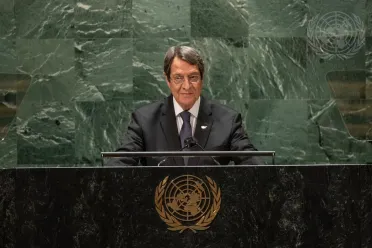Statement
Statement summary
NICOS ANASTASIADES, President of Cyprus, said that the collective and shared failure to decisively tackle global challenges, had “let down and disappointed many people across the world, whose fundamental human rights and dignity were not adequately protected”. “Selfish interests hinder the founding principles of the United Nations, in which humanity has vested its hopes for a prosperous and peaceful future,” he stated, noting that the only way forward was through multilateralism, tangible solidarity and stronger partnerships. In this context, he expressed his country’s “unwavering support” to the reform of the United Nations that would give real hope to those in need of international protection, collective security, peace and development.
Recalling that his country still endures the consequences of a “blatant violation of the fundamental principles of the United Nations”, he challenged Turkey’s statements about “exhausted efforts for a compromise” and calls for a settlement based on the so-called “realities on the ground”. Detailing “the true realities on the ground”, he went on to warn that “Turkey’s end game is not to solve the Cyprus problem, but to turn Cyprus into its protectorate”. Pointing to the Conference on Cyprus at Crans Montana, he blamed “Turkey’s inflexible stance and insistence on maintaining the anachronistic Treaty of Guarantee, the right of intervention and a permanent presence of troops” for the unsuccessful outcome of the negotiations. With that in mind, he stated that a compromise was not possible because “one side deviates from the United Nations framework or annuls agreements reached and aspires to a different form of settlement, contrary to the agreed basis”.
A compromise becomes even more difficult to reach when new ideas ‑ put forward at the request of the Secretary-General to move the process forward ‑ are rejected, he said, highlighting his proposals for the decentralization of powers and establishment of a parliamentary system with a ceremonial Head of State and rotating Prime Minister, among others. For its part, Cyprus is determined to set the negotiation process back on track based on the United Nations framework and the agreement reached in Berlin on 25 November 2019. The only way forward is “a settlement that will equally benefit all Cypriots, Greek Cypriots and Turkish Cypriots, fully respecting their human rights and contributing to the peace and stability of the region,” he declared.
On climate change, he cited a regional action plan, consisting of two components: a scientific and an intergovernmental one. Taking note of the recent events in Afghanistan, he declared: “We share a collective responsibility to uphold international humanitarian law, particularly as regards the protection of women and minorities.” “We also need to ensure that Afghanistan does not become a safe haven for terrorism and extremism, or a breeding ground for organized crime, weapons and drug trafficking and renewed waves of illegal migration,” he added. As a strong proponent of stability and peace in the Eastern Mediterranean and the greater Middle East, Cyprus strives to actively promote an enhanced network of regional cooperation.
Full statement
Read the full statement, in PDF format.
Photo

Previous sessions
Access the statements from previous sessions.
